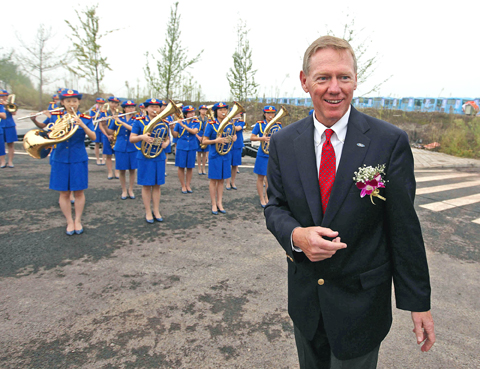Ford Motor Co said yesterday it plans to spend US$490 million on building a third assembly plant in China, ramping up production to meet surging demand in this fast-growing market as it expands in Asia.
The factory, to be built in the central Chinese city of Chongqing, will make the next-generation Focus compact car, which Ford plans to sell globally.
The announcement from Chongqing came the day after the Dearborn, Michigan-based automaker unveiled a made-in-India compact car — part of a drive to boost sales in Asia, a region the US automaker has hardly dented but is counting on to drive growth.

PHOTO: BLOOMBERG
“Today’s announcement reinforces our commitment to the further expansion of our China operations to meet the continued rise in demand from Chinese consumers for world-class Ford products and services,” Ford chief executive Alan Mulally said in a statement.
While in India earlier this week, Mulally said he expects one-third of global car sales to come from Asia in 20 years, a third from the Americas and a third from Europe and Russia.
China is proving a lifesaver for all the big automakers, helping offset declining sales elsewhere.
Total sales in the first eight months of the year rose to 8.33 million units, up nearly 30 percent from a year earlier, according to the China Association of Automobile Manufacturers. China overtook the US as the world’s largest auto market earlier this year, with sales last month jumping 82 percent from a year earlier to 1.14 million units.
The Chongqing plant, part of its joint venture Changan Ford Mazda Automobile Co, is the third for Ford in China and its second in Chongqing, an industrial hub of 30 million people sprawled along the upper reaches of the Yangtze River.
Slated for full completion by 2012, Ford said the plant will be equipped to make other small cars on the company’s global C-car platform in addition to the Focus.
Ford lags behind other automakers in Asia, capturing only 2 percent of auto sales there, compared with nearly 15 percent in North America and 10 percent in Europe.
Ford currently produces 450,000 vehicles in China annually. The new Chongqing facility will initially be able to manufacture 150,000 cars per year, with the capacity to produce 600,000 by 2012 when the plant is at full capacity, the company said.
The company says it plans to introduce four new vehicles in the Chinese market in three years.
The next-generation Focus, scheduled to debut in January at the North American International Auto Show, represents a shift toward C-segment vehicles that Ford says it expects to account for nearly 28 percent of global sales by 2013.

MORE VISITORS: The Tourism Administration said that it is seeing positive prospects in its efforts to expand the tourism market in North America and Europe Taiwan has been ranked as the cheapest place in the world to travel to this year, based on a list recommended by NerdWallet. The San Francisco-based personal finance company said that Taiwan topped the list of 16 nations it chose for budget travelers because US tourists do not need visas and travelers can easily have a good meal for less than US$10. A bus ride in Taipei costs just under US$0.50, while subway rides start at US$0.60, the firm said, adding that public transportation in Taiwan is easy to navigate. The firm also called Taiwan a “food lover’s paradise,” citing inexpensive breakfast stalls

TRADE: A mandatory declaration of origin for manufactured goods bound for the US is to take effect on May 7 to block China from exploiting Taiwan’s trade channels All products manufactured in Taiwan and exported to the US must include a signed declaration of origin starting on May 7, the Bureau of Foreign Trade announced yesterday. US President Donald Trump on April 2 imposed a 32 percent tariff on imports from Taiwan, but one week later announced a 90-day pause on its implementation. However, a universal 10 percent tariff was immediately applied to most imports from around the world. On April 12, the Trump administration further exempted computers, smartphones and semiconductors from the new tariffs. In response, President William Lai’s (賴清德) administration has introduced a series of countermeasures to support affected

CROSS-STRAIT: The vast majority of Taiwanese support maintaining the ‘status quo,’ while concern is rising about Beijing’s influence operations More than eight out of 10 Taiwanese reject Beijing’s “one country, two systems” framework for cross-strait relations, according to a survey released by the Mainland Affairs Council (MAC) on Thursday. The MAC’s latest quarterly survey found that 84.4 percent of respondents opposed Beijing’s “one country, two systems” formula for handling cross-strait relations — a figure consistent with past polling. Over the past three years, opposition to the framework has remained high, ranging from a low of 83.6 percent in April 2023 to a peak of 89.6 percent in April last year. In the most recent poll, 82.5 percent also rejected China’s

PLUGGING HOLES: The amendments would bring the legislation in line with systems found in other countries such as Japan and the US, Legislator Chen Kuan-ting said Democratic Progressive Party (DPP) Legislator Chen Kuan-ting (陳冠廷) has proposed amending national security legislation amid a spate of espionage cases. Potential gaps in security vetting procedures for personnel with access to sensitive information prompted him to propose the amendments, which would introduce changes to Article 14 of the Classified National Security Information Protection Act (國家機密保護法), Chen said yesterday. The proposal, which aims to enhance interagency vetting procedures and reduce the risk of classified information leaks, would establish a comprehensive security clearance system in Taiwan, he said. The amendment would require character and loyalty checks for civil servants and intelligence personnel prior to